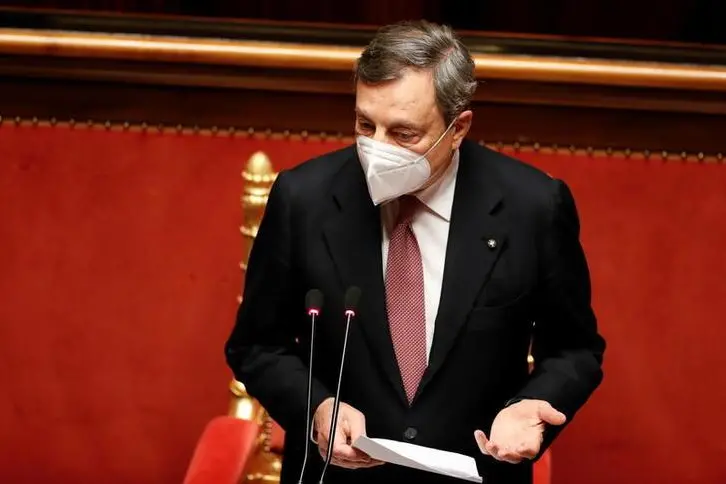PHOTO
(The author is a Reuters Breakingviews columnist. The opinions expressed are his own.)
LONDON - The European Union’s support is a mixed blessing for Mario Draghi. Italy’s new prime minister on Wednesday laid out his plans for an ambitious overhaul of the public sector and judiciary to help the euro zone economy grow out of its debt. Cash from the EU’s recovery fund will help. But large-scale bond-buying by the European Central Bank, a policy that Draghi pioneered, means there’s less urgency for change.
Having spent years as a central banker exhorting governments to reform, Draghi is not wasting his chance. In his maiden speech to parliament, he announced the outlines of a bold agenda. His initial priority is to vaccinate the country and then to rebuild it with the help of grants and loans from the EU’s recovery fund, which has earmarked 209 billion euros for Italy. With government debt exceeding 160% of annual output last year the country also urgently needs to find ways to boost its sluggish growth.
Draghi’s plan looks sound. As well as investing in education, he wants to reduce the tax burden and stamp out evasion. Italy’s tax wedge, the difference between gross salary and take-home pay, is 36.6% versus 31.5% for the rest of the EU, Barclays reckons. Draghi also hinted at making the public sector more efficient and meritocratic. And he called for changes to Italy’s courts, where cases can take five times longer to complete than in the rest of the continent. All these improvements should help to unblock investment.
Previous Italian prime ministers have also attempted far-reaching reforms. Draghi’s closest recent peer is probably Mario Monti, the experienced technocrat whose government took charge during the euro zone sovereign debt crisis in 2011. Like Draghi, Monti had initial broad support from the country’s political parties. Yet he lost that within a year.
Draghi has some advantages. Ultra-low interest rates, supported by the ECB’s loose monetary policy, mean the yield on 10-year Italian government bonds is just 60 basis points, less than a tenth of the cost of borrowing when Monti took power. The lack of pressure from financial markets gives Draghi time to implement his reforms. But it may also make it harder for him to persuade Italy’s politicians to accept the need for painful change.
CONTEXT NEWS
- Italian Prime Minister Mario Draghi on Feb. 17 promised sweeping reforms of the country’s judiciary, public administration and tax system, in his maiden speech to the country’s parliament.
- The former head of the European Central Bank said his administration would throw all its efforts into defeating Covid-19 while looking to leave a stronger, greener nation for future generations.
- "Today we have, as did the governments of the immediate post-war period, the possibility, or rather the responsibility, to launch a new reconstruction," said Draghi, ahead of a mandatory confidence vote he is expected to win with ease.
- His immediate priorities will be ensuring a smooth coronavirus vaccination campaign and re-writing plans for how to spend more than 209 billion euros ($250 billion) of European Union funds aimed at rebuilding the economy.
- To guarantee the money is well spent, Draghi signalled that he wanted to overhaul the public administration, which is throttled by red tape, and the justice system, one of the slowest in Europe. He also pledged to reform income tax.
(The author is a Reuters Breakingviews columnist. The opinions expressed are his own.)
(Editing by Peter Thal Larsen and Karen Kwok) ((neil.unmack@thomsonreuters.com; Reuters Messaging: neil.unmack.thomsonreuters.com@reuters.net))





















